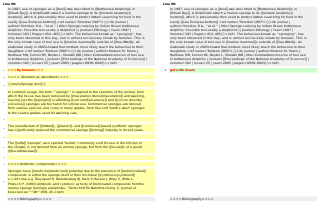
Delphi, in legend previously called Pytho (Πυθώ), was an ancient sacred precinct and the seat of Pythia, the major oracle who was consulted about important decisions throughout the ancient classical world. The ancient Greeks considered the centre of the world to be in Delphi, marked by the stone monument known as the Omphalos of Delphi (navel).

In slang, a troll is a person who posts deliberately offensive or provocative messages online or who performs similar behaviors in real life. The methods and motivations of trolls can range from benign to sadistic. These messages can be inflammatory, insincere, digressive, extraneous, or off-topic, and may have the intent of provoking others into displaying emotional responses, or manipulating others' perception, thus acting as a bully or a provocateur. The behavior is typically for the troll's amusement, or to achieve a specific result such as disrupting a rival's online activities or purposefully causing confusion or harm to other people. Trolling behaviors involve tactical aggression to incite emotional responses, which can adversely affect the target's well-being.

Spamming is the use of messaging systems to send multiple unsolicited messages (spam) to large numbers of recipients for the purpose of commercial advertising, non-commercial proselytizing, or any prohibited purpose, or simply repeatedly sending the same message to the same user. While the most widely recognized form of spam is email spam, the term is applied to similar abuses in other media: instant messaging spam, Usenet newsgroup spam, Web search engine spam, spam in blogs, wiki spam, online classified ads spam, mobile phone messaging spam, Internet forum spam, junk fax transmissions, social spam, spam mobile apps, television advertising and file sharing spam. It is named after Spam, a luncheon meat, by way of a Monty Python sketch about a restaurant that has Spam in almost every dish in which Vikings annoyingly sing "Spam" repeatedly.

Pythia was the title of the high priestess of the Temple of Apollo at Delphi. She specifically served as its oracle and was known as the Oracle of Delphi. Her title was also historically glossed in English as the Pythoness.

Dial-up Internet access is a form of Internet access that uses the facilities of the public switched telephone network (PSTN) to establish a connection to an Internet service provider (ISP) by dialing a telephone number on a conventional telephone line which could be connected using an RJ-11 connector. Dial-up connections use modems to decode audio signals into data to send to a router or computer, and to encode signals from the latter two devices to send to another modem at the ISP.

CompuServe, Inc. was an American online service, the first major commercial one in the world. It opened in 1969 as a timesharing and remote access service marketed to corporations. After a successful 1979 venture selling otherwise under-utilized after-hours time to Radio Shack customers, the system was opened to the public, roughly the same time as The Source.

GEnie was an online service created by a General Electric business, GEIS, that ran from 1985 through the end of 1999. In 1994, GEnie claimed around 350,000 users. Peak simultaneous usage was around 10,000 users. It was one of the pioneering services in the field, though eventually replaced by the World Wide Web and graphics-based services, most notably AOL.

An Internet forum, or message board, is an online discussion site where people can hold conversations in the form of posted messages. They differ from chat rooms in that messages are often longer than one line of text, and are at least temporarily archived. Also, depending on the access level of a user or the forum set-up, a posted message might need to be approved by a moderator before it becomes publicly visible.

John McCarthy was an American computer scientist and cognitive scientist. He was one of the founders of the discipline of artificial intelligence. He co-authored the document that coined the term "artificial intelligence" (AI), developed the programming language family Lisp, significantly influenced the design of the language ALGOL, popularized time-sharing, and invented garbage collection.
An online service provider (OSP) can, for example, be an Internet service provider, an email provider, a news provider (press), an entertainment provider, a search engine, an e-commerce site, an online banking site, a health site, an official government site, social media, a wiki, or a Usenet newsgroup.

Prodigy Communications Corporation was an online service from 1984 to 2001 that offered its subscribers access to a broad range of networked services. It was one of the major internet service providers of the 1990s.
Online service provider law is a summary and case law tracking page for laws, legal decisions and issues relating to online service providers (OSPs), like the Wikipedia and Internet service providers, from the viewpoint of an OSP considering its liability and customer service issues. See Cyber law for broader coverage of the law of cyberspace.
When a message is replied to in e-mail, Internet forums, or Usenet, the original can often be included, or "quoted", in a variety of different posting styles.

The Bogdanov affair was an academic dispute over the legitimacy of the doctoral degrees obtained by French twins Igor and Grichka Bogdanov and a series of theoretical physics papers written by them in order to obtain degrees. The papers were published in reputable scientific journals, and were alleged by their authors to culminate in a theory for describing what occurred before and at the Big Bang.
A Usenet personality was a particular kind of Internet celebrity, being an individual who gained a certain level of notoriety from posting on Usenet, a global network of computer users with a vast array of topics for discussion. The platform is usually anonymous, although users can get celebrity status, usually by being deemed different from other posters in some way.
The Big Electric Cat, named for an Adrian Belew song, was a public access computer system in New York City in the late 1980s, known on Usenet as node dasys1.

Usenet, USENET, or, "in full", User's Network, is a worldwide distributed discussion system available on computers. It was developed from the general-purpose Unix-to-Unix Copy (UUCP) dial-up network architecture. Tom Truscott and Jim Ellis conceived the idea in 1979, and it was established in 1980. Users read and post messages to one or more topic categories, known as newsgroups. Usenet resembles a bulletin board system (BBS) in many respects and is the precursor to the Internet forums that have become widely used. Discussions are threaded, as with web forums and BBSes, though posts are stored on the server sequentially.
The history of email spam reaches back to the mid-1990s when commercial use of the internet first became possible - and marketers and publicists began to test what was possible.











